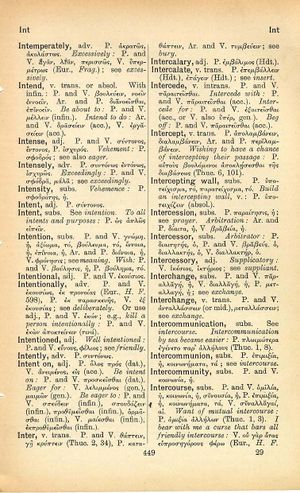intend: Difference between revisions
From LSJ
Εἰ μὲν ἐπ' ἀμφοτέροισιν, Ἔρως, ἴσα τόξα τιταίνεις, εἶ θεός (Rufinus, Greek Anthology 5.97) → If, Eros, you're stretching your bow at both equally, then you're a god.
(CSV4) |
m (Woodhouse1 replacement) |
||
| Line 1: | Line 1: | ||
{{Woodhouse1 | {{Woodhouse1 | ||
|Text=[[File:woodhouse_449.jpg|thumb|link={{filepath:woodhouse_449.jpg}}]] | |Text=[[File:woodhouse_449.jpg|thumb|link={{filepath:woodhouse_449.jpg}}]] | ||
===verb transitive or absolute=== | |||
[[with]] infin.: [[prose|P.]] and [[verse|V.]] [[βουλεύειν]], [[νοεῖν ἐννοεῖν]], [[Aristophanes|Ar.]] and [[prose|P.]] [[διανοεῖσθαι]], [[ἐπινοεῖν]]. | |||
[[be about to]]: [[prose|P.]] and [[verse|V.]] [[μέλλειν]] (infin.). | |||
[[intend to do]]: [[Aristophanes|Ar.]] and [[verse|V.]] [[δρασείειν]] (acc.), [[verse|V.]] [[ἐργασείειν]] (acc.). | |||
}} | }} | ||
Revision as of 08:55, 20 May 2020
English > Greek (Woodhouse)
verb transitive or absolute
with infin.: P. and V. βουλεύειν, νοεῖν ἐννοεῖν, Ar. and P. διανοεῖσθαι, ἐπινοεῖν.
be about to: P. and V. μέλλειν (infin.).
intend to do: Ar. and V. δρασείειν (acc.), V. ἐργασείειν (acc.).

